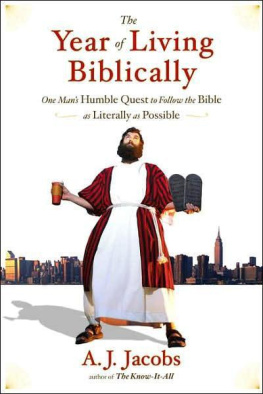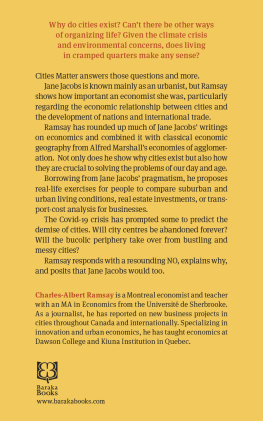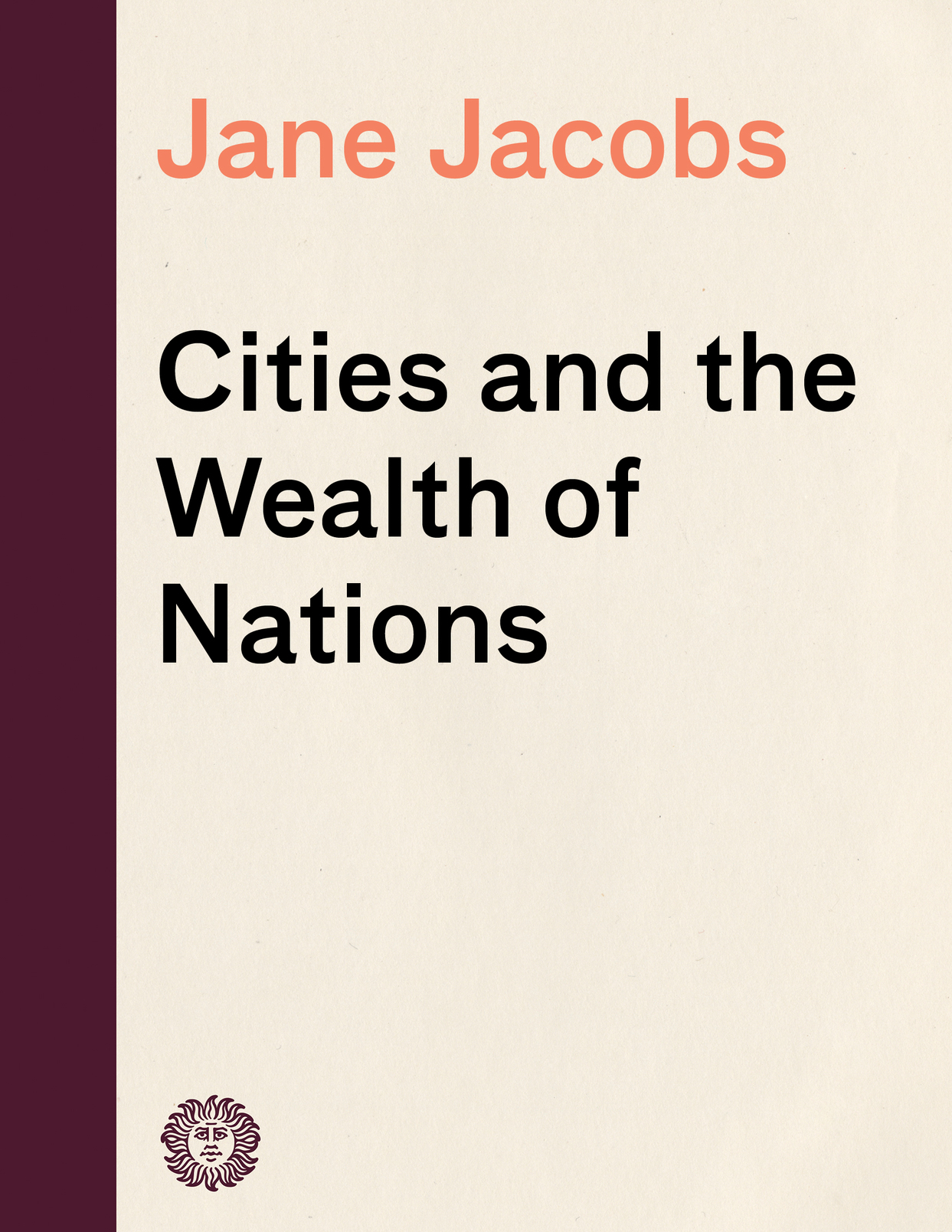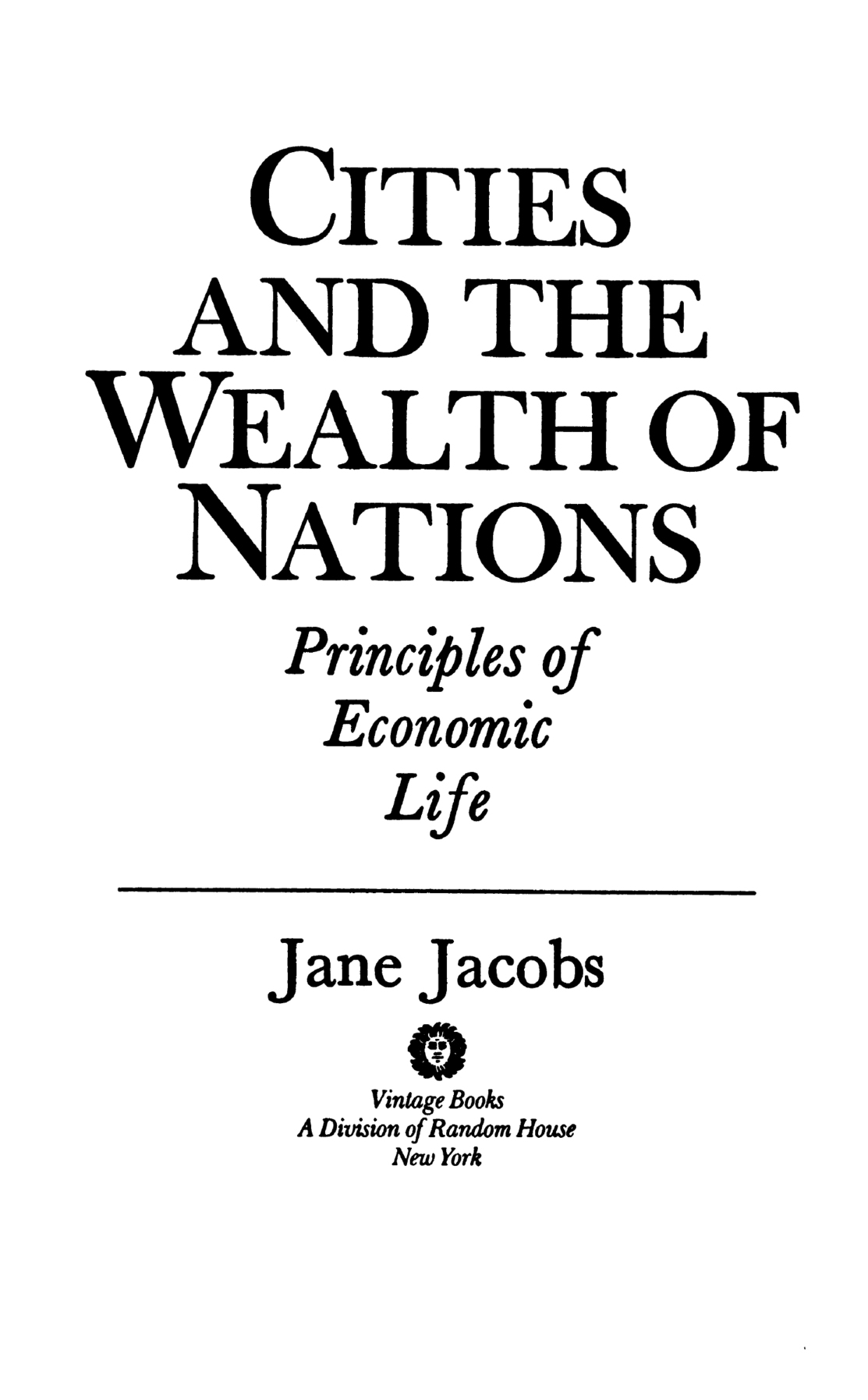Contents
First Vintage Books Edition, May 1985
Copyright 1984 by Jane Jacobs
All rights reserved under International and Pan-American Copyright Conventions. Published in the United States by Random House, Inc., New York, and simultaneously in Canada by Random House of Canada Limited, Toronto.
Originally published by Random House, Inc., in 1984.
Grateful acknowledgment is made to the following for permission to reprint previously published material:
Cambridge University Press: Four lines from a translation of Lao Tzu published in Science and Civilization in China, Vol. II, by Joseph Needham. Copyright 1956 by Joseph Needham. Used with permission.
The Wall Street Journal: Excerpt from Domestic Feud: War Among the States for Jobs and Business Becomes Ever Fiercer, by Timothy Schellhardt, Reprinted by permission of The Wall Street Journal, Copyright 1983 by Dow Jones & Company, Inc. All Rights Reserved.
Library of Congress Cataloging in Publication Data Jacobs, Jane, 1916
Cities and the wealth of nations.
Reprint. Originally published: New York: Random House, c 1984.
Includes bibliographical references and index.
1. Urban economics. 2. Economic history. 3. Wealth.
I. Title.
[ H 1321. J 319 1985] 330.91732 84-40523
ISBN9780394729114
Ebook ISBN9780525432876
v4.1
a
This book is for
Jason Epstein,
who has waited so long for it
with good humor and good counsel
CONTENTS
ONE
Fools Paradise
For a little while in the middle of this century it seemed that the wild, intractable, dismal science of economics had yielded up something we all want: instructions for getting or keeping prosperity. Economists and the rulers they advise had thought up so many ideas for ridding national and international economies of chanciness and disaster, and the ideas had such an air of rationality, predictability and informed statistical analysis, that governments took to supposing they need only muster up commitment, expertise and money to make economic life do their bidding.
Under this delusion, Mao Tse-tung decreed that the economy of China was to take a Great Leap Forward. Khrushchev, visiting the United Nations, banged his shoe on the table and foretold a Soviet economy that by 1975 would overtake Americas and thereafter proceed to bury the West. In the United States, Presidents Kennedy and Johnson and their advisers not only assumed, as most Americans did, that the countrys high productivity and economic supremacy were assured far into the future; they also assumed that the fiscal measures they were using to fine-tune the economy were going to eliminate even its jiggles: no more depressions, and soon no more recessions. The British were constructing, or thought they were, a prospering and advancing welfare state with work and a decent, continually improving living standard for all, somewhat on the Scandinavian model. The European Economic Community, modeling itself on the continentally integrated U.S. economy, was working well for its original member states. Six or seven South American countries were taking the first steps to adopt it as a model for their continent. Poor countries on the fringes of Europe were anticipating great prosperity when it came their turn to join the European community and share in supplying its huge, integrated and safely wealthy markets. The Bretton Woods agreements of 1944, pegging the values of Canadian and most Western European currencies firmly to the rock of the U.S. dollar, and Soviet money-management techniques which equally firmly pegged Soviet-bloc currencies to the ruble, were taken to demonstrate that fluctuating currency values among national trading partnersso painful for debtor nations, so unsettling to the calculations of multinational corporations and tourist industrieswere vestiges of a less sophisticated past. People and rulers in backward countries, including those that had just won independence from colonial rule or were still struggling to do so, expected professionally drawn up development schemes to engineer prosperity and progress for them too. Their expectations were fully shared in countries financing development schemes with loans or gifts. Thus the very phrases backward countries and poorest countries dropped from the vocabularies of economists, civil servants, bankers and editors and were replaced by developing countries and less developed developing countries, or DCs and LDDCs, as the confident shorthand had it.
Recipes for accomplishing all thiscreating prosperity where it didnt exist and maintaining it where it diddiffered under the influence of differing ideologies, but less than one might suppose. For example, when the American and Soviet governments competed for allegiance of a poor country by offering economic aid, the competition didnt take the form of different conceptions of aid. Rather, the two powers competed to supply much the same dams, roads, fertilizer plants and irrigation systems. The economic programs Polands government adopted were largely financed by West German and American bankers. The bankers disapproved of Communist state ownership and probably of many other Polish arrangements as well; all the same, Polish conceptions of how an economy expands and develops, what it needs for the purpose, and how it earns the wherewithal to carry and repay development financing were perfectly familiar conceptions to the capitalist bankers: conventional, logical.
In theory everything was so logical. In reality so little worked out the way it was supposed to.
Now we live in a distraught time of failed development schemes. The results range from outright disasters, as in Poland, Iran, Uruguay, Argentina, Brazil, Mexico, Turkey and most of Africa, to the mere disappointments, as in Ireland, Canada, southern Italy, Yugoslavia, Cuba and India, to mention a few examples in both categories. China, after the swift, catastrophic failure of the Great Leap, has thrashed about, trying first this strategy to overcome its poverty and backwardness, then that, each new departure hailed as revolutionary and each petering out in confusion and recriminations.
The Soviet Union, far from demonstrating the superiority of its planning and performance, continues unable so much as to feed itself, nor in other respects does it produce amply and diversely for its own people and producers. Indeed, as an economy, the Soviet Union is eerily beginning to resemble a colonial country, for it depends increasingly upon exporting natural resources to more highly developed countries and on importing sophisticated manufactured goods, including even the machinery needed to exploit its natural resources for export. To arrive at economic colonialism was hardly the aim of all those Five Year Plans, yet that is how things are working out.
Britain first tried to reverse its decline and decay by depending primarily on what are called demand-side measures, to no avail. Then it joined the European Economic Community, to no avail. Then it switched to what are called supply-side measures, again to no avail. No matter what Britain has tried, it has continued in the grip of unrelenting decline, much like any other faded, fabled empire of the distant past before people had economic theories and instructions and statistics to guide them.












